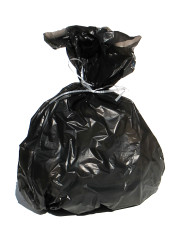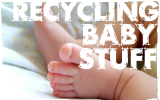How can I reduce the amount of bin bags I use?
 There is a lot of chatter in the US and the UK at the moment about putting a “tax” on plastic carrier bags to stop shops giving them out willy-nilly.
There is a lot of chatter in the US and the UK at the moment about putting a “tax” on plastic carrier bags to stop shops giving them out willy-nilly.
There is already a charge in place in Ireland and I read something the other day that explained while the amount of carrier bags given out by shops has dropped dramatically, the number of bin liners and garbage bags sold has increased because so many people used to reuse the carriers in the bin. That makes it feel like less of a victory – and it’s not exactly a huge victory to start with.
The thought of buying something to use to aid throwing stuff away seems really counter-intuitive to my brain but without using bin liners or the like, we’re constantly having to scrub out our kitchen bin with pretty harsh chemicals – we’re not big wasters, we compost as much as we can and most packaging we get is recyclable, so usually the only things that end up in there are pretty yacky.
So is there a line between disposable plastic bags and endless bleachy scrubbing? I thought about newspapers – a sheet as a throwaway liner would probably be fine for all but the wettest stuff – but since we don’t buy them either, that’s not an option really – what is?
























Canada is having this problem too.
Back when I was a kid, a thousand years ago!, we did use newspapers to line the can…admittedly it wasn’t quite as sanitary as the bags, but didn’t use up the landfill either. Now, I am required to use bags when I dispose of my trash in the “bin”. I feed four dogs and four cats, so I reuse the bags, tying with a twist tie. I also reuse grocery store bags for trash can liners, but they easily outpace my ability to use them up and always wind up with a whole sackful to take back for recycling.
I don’t buying bags for the garbage either. Think about saving little bags like cereal box liners and coffee bags for the wet stuff. Then it can go in a newspaper lined bin without making it icky.
Newspaper can be run through the sewing machine to make larger bags for when you do a big tidy.
Here, Canada, we can buy starch based garbage bags that decompose.
Reduce the number of bags that you use by ensuring that a) the bag FITS the bin properly (too small and it’ll break and you’ll end up using two; too big and you’ll waste space) and b) squashing all un-recyclable stuff as small as possible. I have to go round after my husband who seems to think that not only do bin bags grow on trees but that the number of them going into landfill doesn’t matter!
In addition to reusing larger bags that get emptied, such as dog food and large quantity grain bags, I’ve been able to reuse the bags that the local coffee place gives me when I pick up coffee grounds for my garden. I don’t mind the smell of coffee in the garbage. Perhaps there are other sources that get materials in large bags that would be happy to have them taken off their hands: a win- win situation.
I’d also go with the options of firstly, trying to reduce the amount of waste that could not be recycled or composted, and secondly, reusing junk mail and plastic bags from cereals, grains and pet food for wrapping/bagging up wet waste in. Purchasing biodegradable bin bags would be a final option, but do have a few in the house for rubbish bin emergencies. Try to set a waste reduction goal, such as taking out the rubbish only once in 2 weeks.
We don’t have to bag our waste, so I chuck some stuff straight in the outside bin. (We’re ‘lucky’ in that the block’s bins are right outside our back door).
I’d love to get rid of our kitchen bin because I’d rather have the space, but my fiance can’t get his head round that idea… yet.
Those bags that toilet rolls come in are useful for rubbish, and the sliced bread bags. I tend to re-use food bags several times, and then at the end of their life use them to wrap rubbish.
Would you consider scalding your bin, rather than bleaching it? I’m not sure what that involves, but the old fashioned household management books seem to think it’s the right thing to do to pretty much every piece of kitchen equipment!
Here are some hints:
1) RECYCLE! RECYCLE! RECYCLE! Check to see if your community, church or school collects recyclables as a fundraiser. This cuts down on about half of our household trash! We save aluminum cans for church, paper for the school, and our city collects or has drop-off bins for the cardboard, glass, plastic and yard waste. Many cities in the US have scrap dealers who will buy metal cans, lawn chairs, rusty plant stands, furniture, ANYTHING metal that you may discard. You will save the environment AND get some money!
2) If you don’t recycle, COMPACT! Step on that cardboard or plastic milk carton before you discard it. Why pay for the space the air inside takes up? Ditto for cereal, frozen food, and juice boxes. If you can’t recycle them, break them down and fold or cut them into smaller pieces rather than tossing the entire assembled box of air. Squish aluminum cans and use your can opener to cut the top & bottom off of steel cans and step on the remaining cylinder to save space.
3) Use layers of newspaper to keep weeds down in your garden and to hold in the moisture. Eggshells and coffee grounds are good nutrients to add to your garden, especially tomatos. Also start a compost pile for banana peels, orange rinds, potato peels, grass clippings, and other organic materials from cooking.
4) Donate to charity! Don’t throw away useable clothing, household items, odd dishes, furniture, etc. Many auto repair shops will appreciate old t-shirts and similar clothing to use as shop rags. Collect small items in a box in the closet and when friends visit, invite them to go through the box for anything they may want. Something that no longer fits or matches your decor may be perfect for them.
“Scalding” means sluicing things down or dunking them in very hot water.
This does have an energy cost (to heat the water) but is probably better than using bin liners.
Must admit, I’m confused as to why other people are so worried about how dirty their bin will get without a bag in it – what exactly are you all putting in there??? Maybe I just have very low standards, but it is a bin after all – it’s kind of supposed to be dirty…
It’s only our sits-in-the-kitchen bin that I clean out – the wheelie bin can get as filthy as it likes ;)